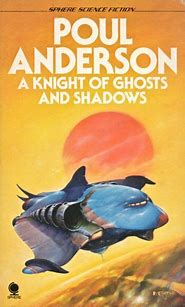In the Psychotechnic History, there is the much quoted (by me) observation that the protean enemy is man himself.
In The Technic History
Dying, the Hermetian revolutionary, Benoni Strang, says that everything he did was for Hermes.
At the climax of A Knight of Ghosts and Shadows, Aycharaych explains all his deceptions and appeals for Flandry's help, addressing the latter by his first name...
We enter into Tachwyr's disappointment when he realizes that he will not live to see victory.
These powerful passages transcend good guys-bad guys routines.

17 comments:
Personally, I've never thought in terms of good guys and villains (except for narrative purposes). I think in terms of me/thee and us/them.
Kaor, Mr. Stirling and Paul!
Mr. Stirling: I thought some of the characters you created were indisputably evil. Such as Count Ignatieff and Adrienne Breze. A cannibalistic Satanist and a Sadistic vampire!
Paul: No matter his motives or excuses, Benoni Strang's fanaticism makes me regard him with hostility. He reminds me too much of monsters like Robespierre, Lenin, Stalin, Hitler, Mao, Pol Pot, et nauseatingly al!
Ad astra! Sean
I think good guys-bad guys is just in fiction.
Sean,
What I am doing here is not expressing any opinion about Benoni Strang. I am noting that Anderson shows us this character's feelings.
Paul.
Kaor, Paul!
Yes, but with respect, many times I have noticed that the examples you select seem to be characters whose ideas and policies I THINK you might like to regard with sympathy. I wondered if you might mention characters you possibly disagree with. The example I thought of being David Falkayn's younger brother, and the reasons he had for his rage against Strang.
I hope not to have offended you!
Ad astra! Sean
The interior life of a character can be revealed in fiction. In real life, all you've got to judge a human being's character with is their actions. Words lie, actions reveal, and you are what you do.
Kaor, Mr. Stirling!
I agree, which is why I condemn fictional tyrants like Strang and the real ones I listed above.
Ad astra! Sean
Sean,
I do not sympathize with Tachwyr's aims or Aycharaych's means.
Strang, since we are now onto that completely different topic, was right to want structural change in Hermetian society but wrong to impose it through an alien invasion.
Paul.
I think we are shown John Falkayn's feelings as well but the point of the post was that some villains, after being defeated, are shown to have been not only "bad guys" but also "people."
Kaor, Paul!
MY view remains that all the things Strang alleged was wrong with Hermes in MIRKHEIM were too trivial to justify his violence and tyranny. Hermes was NOTHING like the genuinely oppressive set up we see on Unan Besar centuries later in THE PLAGUE OF MASTERS.
Of course I agree that tyrants are also persons. But what matters was HOW they ruled, not whether or not they had some nice motives.
Ad astra! Sean
Sean,
I agree that Strang's violence and tyranny were wrong. We seem to speak past each other on this issue.
Paul.
Kaor, Paul!
But you seem to have the most sympathy for revolutionaries. *I* am more inclined to wonder if "reactionaries" like Grand Duchess Sandra could just barely, remotely, have legitimately defensible points of view of their own.
Ad astra! Sean
Sean,
They do.
Certainly I have the most sympathy with people who want to change things. Without the boycotts, Apartheid would still be in place. Without a lot of protests, yet another policeman would have got away with killing a black man.
But I ought to be able to refer to a character like Strang without going through this discussion every time.
Paul.
Kaor, Paul!
I know, I'm sorry. Simply put, I LOATHE Strang.
Ad astra! Sean
Paul: bear in mind that the future is unknowable, and we cannot be sure (or even moderately confident) of the consequences of our actions.
It's demonstrable that the more ambitious the aim, the less likely our actions are to produce anything like it -- and the higher the probability of disastrous blowback and unintended results.
Therefore, unless the necessity is utter and absolute, better to do nothing except to continue in long-established ruts; at least you can be -somewhat- confident that that won't make matters worse.
Fully agree about the unknowability of the future. Lenin quoted Goethe: (to summarize) Theory is grey. Life is green.
Kaor, Mr. Stirling!
Absolutely! Drastic "reforms" are far too likely to blow up in one's face, with catastrophic results. Which is why Tsar Alexander II did not try to arbitrarily and unilaterally abolish serfdom in one blow in Russia. He took years to bargain, cajole, offer compromises, etc., till he had won enough of a consensus agreeing to its abolition before doing so.
Ad astra! Sean
Post a Comment